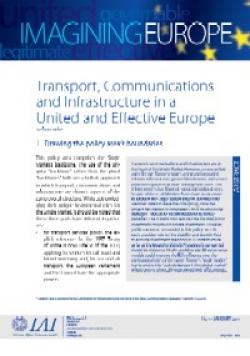Transport, Communications and Infrastructure in a United and Effective Europe
Transport, communications and infrastructure are at the heart of the Single Market. However, a more united and effective Europe requires a new and upgraded relevant infrastructure, greater liberalisation, and service provision regulated by more homogenous rules. This reform process has financial, social and political costs. In spite of these, all Member States have an incentive to advance the Single Market project. Incentives for Member States to leave the core group, once the project has started or has been completed - thus causing huge damages - should be counterbalanced by heavy penalties. The current crisis reduces the risk that public investment crowds-out private investment. However, public resources are needed in this policy area. As such, a golden rule for the Stability and Growth Pact to exclude investment spending in EU infrastructure as far as the Excessive Deficits Procedure is concerned would be welcome. Finally, avoiding sub-28 governance models could improve the EU's influence over the international rules of the game. Europe's "single market" has to evolve into "a single Europe in the global market" where unity is physically intertwined with effectiveness.
Paper produced within the framework of the project "Towards a More United and Effective Europe". Presented at the IAI conference on "Infrastructure, transport and communications in post-crisis Europe", Rome, 20 January 2014.
-
Details
Roma, Istituto affari internazionali, 17 January 2014, 42 p. -
In:
-
Issue
4
1. Drawing the policy area's boundaries
2. A more united and effective Europe
2.1. Defining effectiveness and unity
2.2. The steps towards more unity and effectiveness
2.3. Transport
2.4. Communications
2.5. Infrastructure
3. The core group
4. The non-core group
5. Out of the Single Market, out of the EU
6. Conclusions
References
Topic
Tag
Related content
-
Publication30/12/2014
Imagining Europe
leggi tutto -
Event14/01/2014
Infrastructure, transport and communications in post-crisis Europe
leggi tutto -
Ricerca27/06/2013
Towards a More United and Effective Europe: Beyond the 2014 European Parliament Elections
leggi tutto



